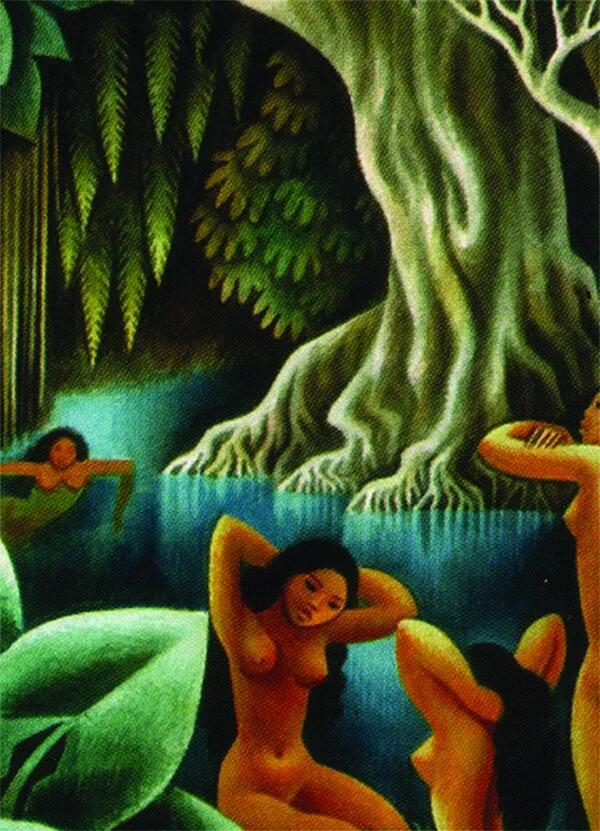Desire Under the Elms
by Eugene O'Neill
AMERICAN CLASSIC
This multi-racial reboot of a Eugene O'Neill classic about ownership and desire won critical acclaim in South Africa for its lyric beauty and boldness.
Warning: Contains nudity.
directed by Fred Abrahamse
featuring Robin Smith, Mbali Bloom and Marcel Meyer
original music by Charl-Johan Lingenfelder
ABRAHAMSE-MEYER PRODUCTIONS
Cape Town, South Africa
The story of O'Neill's 1924 tragedy, about a stepson in love with his stepmother, dates back to the ancient Greeks.
South Africa's Abrahamse-Meyer moves the play's setting from New England to Cape Town where a British farmer brings home a Xhosa bride. Afrikaans-inflected English brings new musicality to O'Neill's spare dialogue of repression and release.
"Inescapably thought-provoking and extremely enjoyable.”
– Rory Appleton, What’s On in Cape Town
In Desire Under the Elms, and in his later work Mourning Becomes Electra, O’Neill explores the plots and themes of Greek tragedy, reimagining classical characters as inhabitants of rural New England farmland. The play was inspired by the tragic love triangle in Hippolytus by Euripides, in which Phaedra, the wife of the Athenian king Theseus, falls in love with and attempts to seduce his son Hippolytus.
The play premiered in 1924 at the Provincetown Playhouse in New York City. A film version, starring Sophia Loren, was produced in 1958.
The following character descriptions are taken from the text of the play:
Eben: He is twenty-five, tall and sinewy. His face is well-formed, good-looking, but its expression is resentful and defensive. His defiant, dark eyes remind one of a wild animal's in captivity. Each day is a cage in which he finds himself trapped but inwardly unsubdued. There is a fierce repressed vitality about him. He has black hair, mustache, a thin curly trace of beard. He is dressed in rough farm clothes.
Ephraim Cabot: [He] is seventy-five, tall and gaunt, with great, wiry, concentrated power, but stoop-shouldered from toil. His face is as hard as if it were hewn out of a boulder, yet there is a weakness in it, a petty pride in its own narrow strength. His eyes are small, close together, and extremely near-sighted, blinking continually in the effort to focus on objects, their stare having a straining, ingrowing quality. He is dressed in his dismal black Sunday suit.
Abbie Putnam: [She] is thirty-five, buxom, full of vitality. Her round face is pretty but marred by its rather gross sensuality. There is strength and obstinacy in her jaw, a hard determination in her eyes, and about her whole personality the same unsettled, untamed, desperate quality which is so apparent in Eben.
About The Production
"...an unpretentious interrogation of the human condition."
- What's On in Cape Town, 2014
The following review of Abrahamse-Meyer's production was originally published on the arts website What's On in Cape Town in July 2014.
Fred Abrahamse brings Eugene O’Neill’s Desire under the Elms to an intimate setting at the Baxter Golden Arrow theatre, in a context to which South Africans can relate.
Transforming a renowned but dusty old classic into a flavourful, relevant and gripping production without detracting from the original is a risky undertaking, and Abrahamse’s success in this regard is that much more powerful as a result.
Any apprehension is forgotten within minutes as the audience is inexorably drawn into an 1890’s tale by turns fascinating, comic and deeply disturbing. The three vastly different characters are linked in their isolation and – true to O’Neill’s roots in tragedy – by their inability to comprehend the perceived darkness around them.
Throw in a twisted love triangle, issues of inheritance, a larger than life ego, half formed ideas of revenge and justice, and serious issues of possessiveness and you’ve got yourself a party, not to mention an enormous challenge for a small cast.
Sharing an undeniable chemistry on stage, the trio of actors – Robin Smith, Marcel Meyer and Mbali Bloom – bring the play to life with a palpable vigour and a wonderful synergy – testament to Abrahamse’s skill as a director.
As the father figure, Ephraim Cabot, Smith’s voice might accurately be described as that of a god preparing to smite something, his bass notes resounding thunderously in a gravelly cadence that is nothing short of mesmerising. Aside from his giant voice, Smith has a colossal presence on stage, effortlessly wielding his character from buffoonery to menace in a heartbeat, leaving the audience barely able to catch its breath.
Ephraim’s son Eben is a complex character, suffering from emotional burdens of the past while retaining something of a childish insolence. He is unsure of himself but occasionally shows a glimpse of steely resolve. Meyer proves incredibly watchable in this role, his performance consistently nuanced and extremely unsettling, tragic and beautiful.
In the middle of all of this, Bloom swans across the stage with a grace that belies the tenacity of her character, Abbie. Bloom brings ferocity to the role, and the result is a character that is as fierce in her ambition as she is in her seduction. But beneath her fiery countenance, there lies a smouldering compassion, and it is here that Bloom’s startling emotional range can be appreciated.
Besides playing the role of Eben, Marcel Meyer also co-adapted the original script with Abrahamse and designed the costumes which manage to be vibrant despite the period constrictions. Abrahamse’s set is eloquent in its simple practicality. A swivelling depiction of a farmhouse with distinctly South African sounds in the background, it is unobtrusive and effective.
Sometimes subtle and sometimes explosive, Desire under the Elms is an unpretentious interrogation of the human condition, seamlessly tailored to fit a South African heritage. Inescapably thought-provoking and extremely enjoyable.
-- Rory Appleton


